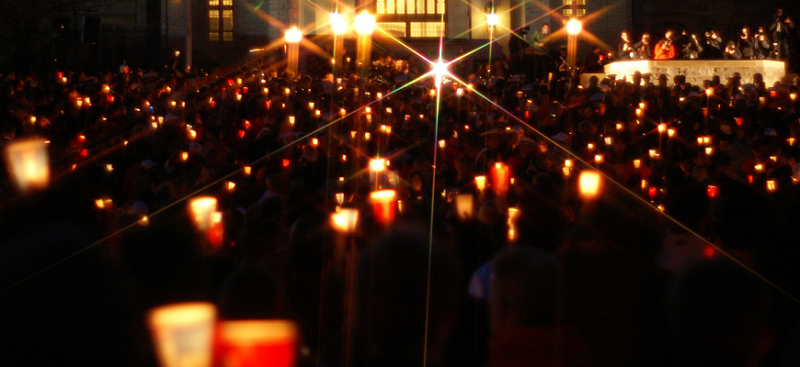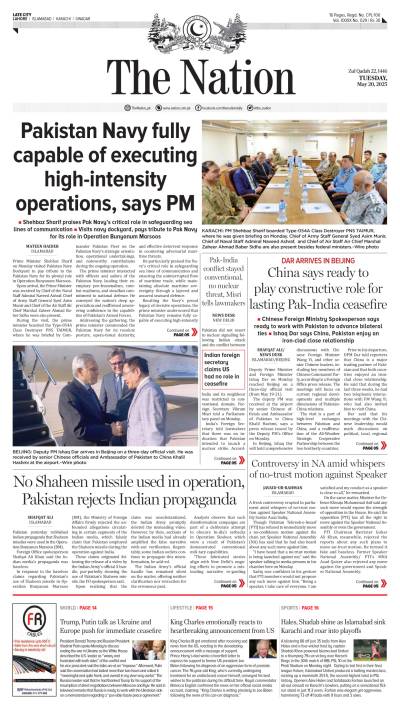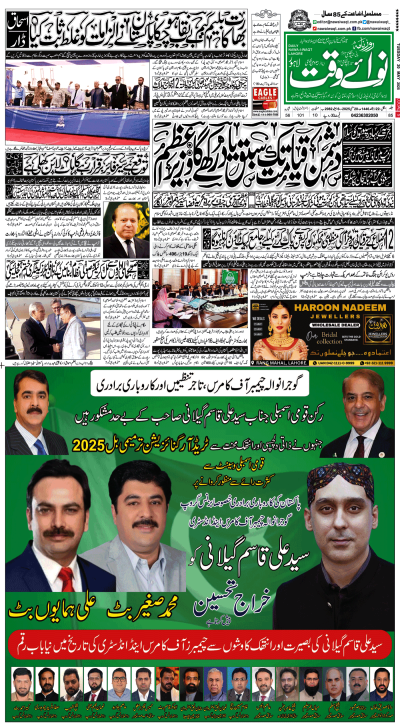Taliban supporters from across Lahore gathered at the Liberty roundabout on Monday to hold a candle-lit vigil to protest against people who hold candle-lit vigils to protests against terrorism.
Hundreds of people from all walks of life participated in the demonstration. They were holding banners and placards inscribed with slogans in favour of terrorism, and vowed to continue supporting terrorism in all its forms and manifestations.
“We are dealing with an ideological problem, and the primary reason behind it is a lack of education,” said a young protester and student leader. “People do not send their children to school, and therefore deprive them of the curriculum that provides them with the ideological justification for a global Jihad,” he elaborated. “Pakistan’s low literacy rate correlates with the fading influence of terrorism in the country.”
Commenting on his Osama bin Laden t-shirt, he said he used to wear Che Guevara t-shirts to protests when he was younger, but they were becoming increasingly hard to find. “So I realised I will have to wear t-shirts carrying pictures of some other mass murderer.”
He urged the general public to sign an online petition in favour of terrorism that his college friends put together. “We raise a very important issue in the petition,” he said. “Liberals argue that all differences must be resolved through dialogue and negotiation. If we eliminate all terrorists in line with the government’s new goal, then who will we negotiate with?”
Many at the protest did not entirely agree with his opinions, uncovering serious ideological fault lines among the supporters of terrorism. “I am against terrorism in general,” one religious leader explained. “I only support terrorism when it is specifically targeting the people who I think follow the wrong faith or belong to the wrong sect.” He said Shia doctors, lawyers and professors were roaming around in the country with impunity. “Is this the Pakistan envisioned by our founding fathers?” he asked. “If we had to live in peace and strive for prosperity, what was the point of creating a new country?”
He admitted that terrorism could sometimes be a problem, but said that the Pakistani and the global response to terrorism was out of proportion. “Hundreds of thousands of people die because of old age every day, much more than are killed by terrorism,” he argued. “Why has the parliament never thought of making an anti-ageing law? Why is the world not spending billions of dollars in scientific research to slow down or stop ageing? Why don’t we see a unanimity against ageing, instead of the frequent unanimity seen in the society against old people?”
A professor who addressed the gathering echoed similar sentiments. He proposed a unique solution to the problem of terrorism that he said could be acceptable to both sides. “I believe terrorism should be allowed in Pakistan,” he explained, “as long as when terrorists are being trained, they are also taught modern subjects such as science, English and computers at their training camps.” He said terrorist training camps were playing a very important role in our society and it was unthinkable to ban them. Instead, he said the government should register them and audit their accounts.
Commenting on the protest, a security analyst termed it a positive development. “We have to look at the problem in its broader regional and global context,” he explained. “How would Malala Yousafzai have won a Nobel prize if there were no terrorism?” he asserted. He said terrorism was also a common link between Pakistan and Afghanistan, and could serve to unite the entire Muslim world in their denial.
“Terrorism is the only thing that has forced all Pakistanis across the political spectrum to unite. What will keep us united after we have eliminated terrorism?” He argued for a regulation of terrorism rather than its elimination, to allow for the country to reap its benefits while also being able to manage and control its disadvantages.
“It is bad timing to eliminate terrorism just before the US withdrawal from Afghanistan, when it was time to reap the benefits,” he said. “We have waited so long for this plan to work out, and sacrificed so many lives. Why couldn’t we have waited for another two years to give the strategy a chance to work?”
Tuesday, May 20, 2025
Candle-lit vigil in favour of terrorism

The author has a degree in Poetics of Prophetic Discourse and works as a Senior Paradigm Officer. He can be contacted at harris@nyu.edu. Follow him on Twitter
-
Lahore emerges among safest global cities in Numbeo 2025 index
-
Lahore emerges among safest global cities in Numbeo 2025 index
-
India’s suspension of Indus Water Treaty legally baseless
-
Seventh polio case reported in Pakistan amid nationwide vaccination drive
-
Pakistan reports sixth polio case of 2025
-
PTA begins issuing VPN licences to regulate usage
The Wider War
May 20, 2025
Margalla on Fire
May 20, 2025
Defeated and Depressed
May 20, 2025
Regional Reset
May 19, 2025
Peak Potential
May 19, 2025
Worse than Anarchy
May 20, 2025
Salute to our Air Force
May 20, 2025
An Unbreakable Wall
May 20, 2025
Profiteering Milk
May 20, 2025
Rewriting the Rules
May 20, 2025
ePaper - Nawaiwaqt
Nawaiwaqt Group | Copyright © 2025





